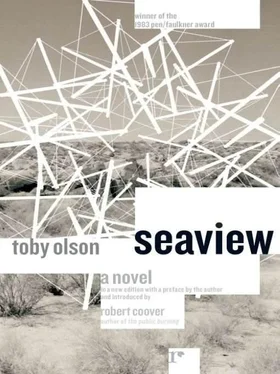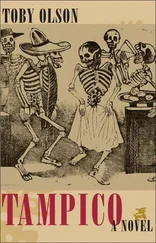For close to a month now, ever since the French Canadian campers, the weekenders, and the other summer tourists had been coming to Seaview Links in some numbers, Sammy had The List out and ready behind the counter. Sammy and Chip had started keeping it two summers before this one, writing down the most interesting questions the tourist-players asked, once they were out of sight. The List got longer, and only a few of the questions were the fake ones that Chip added, appending his name after them in parenthesis in his small clear hand.
THE LIST
1. Is this the golf course?
2. Are you open?
3. Where did you buy the rest room signs?
4. How do I stand?
5. Are you cutting the grass?
6. Do you sell charcoals here?
7. Do you sell fishhooks?
8. Do you believe me when I speak? (Chip)
9. Is the Coke good?
10. Is this the old building?
11. Is this the clubhouse?
12. Is this the right place?
13. If it rains, will I get wet? (Chip)
14. Do you rent balls?
15. Is that the ocean?
16. Can my friend walk with me? Can she hit my balls?
17. Are you a French Canadian too? Sacrebleu! (Chip)
18. Are you a native?
19. Are these the score cards?
20. Is that the foghorn?
21. Are there any places to eat?
22. How deep is the ocean? (Chip)
23. Is it going to rain?
24. How high is the sky? (Chip)
25. Can I wear golf shoes?
26. Does it get cold when it snows?
27. I’m from an elite club in Philadelphia. Can I play here?
28. Did anybody turn in a ball?
29. Are those wooden clubs old?
30. Do you remember anybody? (Chip)
31. Is this the bus stop?
32. What do you do when you play nine holes?
33. What are winter gloves?
34. Is this where you play golf?
35. Will you read this lighthouse? [The Chipper hands over a copy of JW tract to listener] (Chip)
36. Is the wind blowing?
37. Is it raining up here?
38. Do you have buffets?
39. Where is the ocean beach?
40. Who did that wonderful job on the aprons? (Chip)
41. Can we play in one bag?
42. Do you have little sticks to hit the ball off?
43. What do you do in the winter?
44. What kind of white bread is in the sandwiches?
45. Who is the best chipper on the course? (Chip)
46. Can I get married on the cliff?
47. Who makes the grass grow? (Chip)
48. Do you have to take a test to play?
49. What happens when it rains?
50. What happens when the fog comes in? (Chip)
51. Is that the lighthouse?
52. Am I right — or left — handed?
In Hit and Throw Ball, one made every other shot by chucking the ball in the general direction of the green. If one was on the green when a throw shot came up, one simply bowled the ball at the cup. Sammy and Chip also played Cross Golf, Over and Under, Change, Back Ball, and other invented variations. Chip was waiting on the second tee, practicing his windup, when Sammy drove up in a power cart. Ordinarily, on a day as slow as this, Sammy would put his sign out on the door, but on this day the Chair had come in to work at the handicap cards and said he would watch things while Sammy went out to play. He was very nice about offering to do it; it was that kind of day, and ever since the Chair’s encounters in the fog he had seemed a little more relaxed, a little easier about himself. Bob Days, an electrician at the Air Force Station, was doing a little volunteer wiring at the clubhouse and said he would watch out for things too.
Sammy and Chip teed off, both electing to hit their first shots, and when it came to the second, Chip winged his off into the rough to the right of the fairway so that he could get to where the blueberries were. After Sammy had thrown his and they had had a friendly, joshing argument about whether Chip had thrown his ball out of bounds, they both got their balls to the green. Chip was one shot behind Sammy when they got there, so while Sammy had a bowl, Chip had a putt. Sammy missed his bowl, complaining that the green had not been well cut and that that had thrown his ball off. Then they argued about the quality of Chip’s work on and around the green, joking and trading insults. Chip said that nobody who dressed as bad as Sammy did had any right to complain about anything that had to do with quality or taste. Sammy retorted as how Chip might do a better job once he got out of Cape Tech and became an adult. Things went on this way until they, like the others before them, reached the sixth tee and saw the ocean. They could not help themselves either, and they went to the edge of the cliff, said hello to the husbands and wives, and sat and looked.
The beach was crowded, but those on it were as still and awestruck as the ones sitting on the cliff above them. The only movement came from the curling of the edges of beach umbrellas in the breeze and the few children who played in quiet ways in the edge of surf. People sat in beach chairs looking out. Some stood, together or alone, facing the sea. It was so clear, the horizon at such a distance and yet a sharp clear line, that the sea seemed a contained massiveness, and as such dwarfed even the crowded beach, making it seem half empty. In the places between the colorful spread-out blankets and towels with the brown-and-white bodies lying on them, the sand was a clean tan, and where it joined the surf, it darkened and opened, untouched and running as far as they could see to the left, until it hit against the escarpment that moved up to the promontory where the hard white lighthouse stood. Gentle and foamy whitecaps kept the children back, and beyond them the water turned blue, and as it went out and deepened it became emerald green. About two hundred yards out there was a finger of seaweed rising and shifting and lowering in the swell, and beyond the weed, where the water was blue again, long lines of variously colored lobster-pot buoys were bobbing.
The whales’ river appeared so gradually that the watchers on the beach took no notice of it. Those on the cliff saw it coming, a broad white line of gentle turbulence snaking from beyond the promontory on which the lighthouse stood and stretching a good two miles before them, well to the other side of the pots. Then they saw the backs, the dark islands rising, lingering in slow movement along the coast, and sinking again. There was a glittering line in the air above the whales’river: gulls and terns riding the currents, diving occasionally in the whales’ wake, lifting the bait fish that were stirred to the surface. The two lines, of whales and birds, continued far out, moving parallel to shore, and after they had passed a mile off to the right, they turned and headed seaward in the direction of Europe. When the drama was over, the watchers leaned back on the cliff’s edge, realizing they had been tensed by the sight. The sea continued as if nothing at all had happened. Below where the whales had been were the shipwrecked hulls the comers to the New World had left. On a day like this, they might have risen to the surface and moved leisurely in to the shore. Today, there was a Japanese factory boat in the far distance, it was working the water with its indiscriminate nets. Two boats steamed around the lighthouse point and began pulling the lobster pots. There were no pleasure crafts on the sea, and this seemed right. Everything was serious, unconcerned, and real.
Back at the clubhouse, the Chair finished up with the handicap cards, got a cup of coffee, and went into the pro shop to see if there was anything he could use his holdover winnings from last season to buy. Bob Days was there, working on a bad connection, and while the Chair checked out the shirts with the alligators on them and the various versions of the golf cap, they chatted about nothing in particular, and both of them greeted Barney Packett, another enlisted man, when he came in with four cases of beer he had gotten at the P.X. and fed the refrigerator in the small snack-bar area.
Читать дальше












